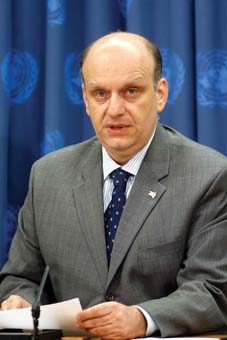Georgia slams UN report
By Temuri Kiguradze
Friday, May 29

The United Nations Security Council convened to discuss Ban Ki-moon’s report on May 27. Differing from previous reports, which were entitled “On the situation in Abkhazia., Georgia” this report was called “Report of the Secretary-General pursuant to Security Council resolutions 1808, 1839 and 1866” and bore no mention of the separatist region of Abkhazia being part of Georgia.
“The Russians threatened to veto the forthcoming June resolution [on the prolongation of the UN mission’s mandate] unless the report of the Secretary-General was titled in the way they wanted it to be titled. This is something that has been reported to me from very reliable sources,” Lomaia said. Speaking in New York at a special briefing, the UN envoy stated that the Russian side had once again tried to “blackmail the international community.” “This blackmail should not be acceptable in the future; there are a lot of negative steps in the report alongside the positive ones.” Lomaia underlined that Russia wants to UN monitoring mission in Georgia to be weak or not exist at all, citing the analogous case of the OSCE monitoring mission, whose prolongation was vetoed by Russia in 2008.
“The Russian side continues to spread propaganda which implies that the Georgian side is mobilising its forces at the administrative borders of Abkhazia and the Tskhinvali region, however no one believes this false propaganda, even [Russian envoy to UN] Churkin himself.” Getting back to Moon’s report, Lomaia noted that “the report failed to notice the elephant in the room.” “The report didn’t mention that thousands and thousands Russian occupiers, heavy artillery and tanks have been stationed in the country violating international regulations,” he said. “The document failed to notice the major human rights violations that have been taking place in various parts of Abkhazia, most notably the ethnic cleansing of Georgians from Upper Abkhazia.” He also said that despite Georgia’s “disapproval” of the report, the country is ready to “constructively participate” in discussions on the future presence of the UN mission.
”Georgia wants to see a powerful UN Mission on Georgia's occupied territories, equipped with strong monitoring and police functions and capable of establishing peace, order and the rule of law in these regions and contributing to the de-occupation of Georgia's territories. We believe that any mission that may be deployed on Georgian territory under the UN’s aegis should aim to carry out monitoring of compliance with the six-point ceasefire agreement of 12 August. At the same time, Georgia can only welcome any mission of the United Nations which will provide an objective picture of the situation in the occupied regions and regularly update the international community on it,” says the special statement published by Georgian Foreign Ministry on May 28, commenting on the UN Security Council negotiations in New York.
The report of UN General Secretary Ban Ki-Moon was due to be published on May 15, however it was delayed by three days, thus hindering the Geneva negotiations between the parties to the August 2008 conflict. The published document called for “a revised security regime” across the Abkhaz administrative border owing to the “erosion” of the previous one, which was in force for over a decade but undermined after the August war. The report also appealed for the extension of the demilitarized zone in the sea to12 nautical miles off the coast and 12 km on either side. In this zone, according to the recommendations, there should be no naval vessels apart from a maximum of five coast guard patrol boats or similar light ships.
The Russian side welcomed the report, stating that it “corresponds to the new realities created in the South Caucasus.” Vitaly Churkin, Russia’s envoy to UN, stated that the recommendations in Moon’s report may be “a good basis for the development of conditions for the continuation of the UN mission’s work.” Discussion on the UN mission’s future in Georgia is scheduled for mid-June in New York. “We are expecting work to be done on the resolution [concerning the prolongation of the UN mandate], so every proposal therein won’t just be accepted without any changes.”
“In a political sense it’s very important that the report doesn’t contain anything that contradicts the new realities in the South Caucasus, anything which would have questioned the status of Abkhazia and South Ossetia as independent countries,” said Churkin, adding that the report has some failings because it “inadequately evaluates the provocational role of the Georgian military in the zones near Abkhazia and pays too much attention to the activity of Russian forces.” Churkin confirmed that Russia will continue to conduct the same policy in the Georgian breakaway regions, which is “directed towards the stabilization and prevention of new Georgian military adventures.”
US Ambassador to Georgia John Tefft has refrained from commenting on the negotiations in New York, stating that “he will wait” until the report is studied in the Washington. However he once again underlined that the US “supports the territorial integrity of Georgia.”
